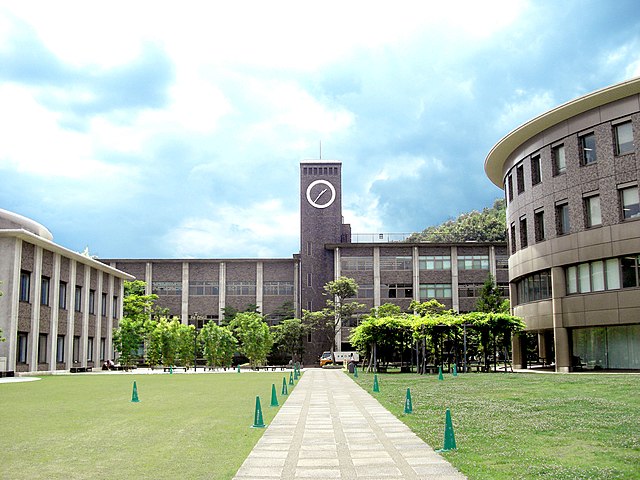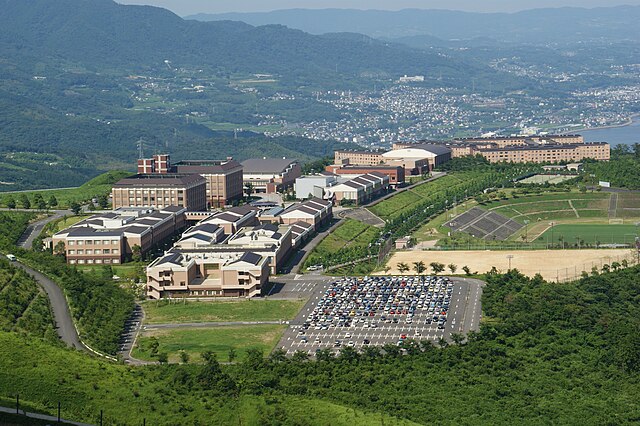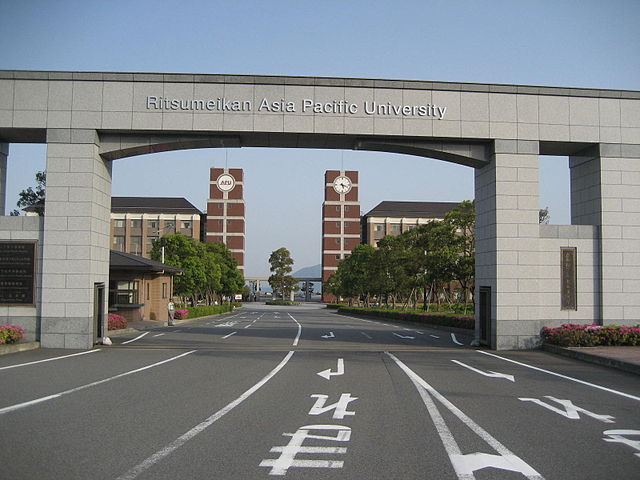Thammasat University students have until 10 November 2020 to register to attend the free virtual 18th Asia Pacific (AP) Conference from Saturday, 14 November to Sunday, 15 November. TU students are cordially invited to register at this link.
Last year’s AP Conference was held in Bangkok in September.
The theme of this year’s event will be Asia Pacific and Beyond: A Pursuit for Inclusion and Innovation.
The Thammasat University Library collection includes many books on inclusion and innovation.
The AP Conference administrative offices are based at Ritsumeikan Center for Asia Pacific Studies (RCAPS), Ritsumeikan Asia Pacific University in Japan.
Ritsumeikan Asia Pacific University (APU) was founded twenty years ago. It is located in Beppu, a city in Ōita Prefecture on the island of Kyushu, Japan, at the west end of Beppu Bay. Beppu is famous for its hot springs.
Kyushu is the third largest island of Japan’s five main islands.
Ritsumeikan APU has an enrollment of about almost 600 students, with about half being from Japan and the rest from 90 other nations and regions. Half of the full-time faculty members are also foreign nationals, from over 30 countries and regions.
The conference will feature interesting programs on such themes as Sustainable Development; Competing COVID-19 narratives in Asia; Macroeconomics; Taking stock of wildlife tourism trends in Asia-Pacific; Social segregation and disparity; Prospects for Asian paths of sustainable development; International cooperation; Supply chain and energy; Innovation and diffusion; Tourism; Health and disability; China and international relations; Key issues in tourism, hospitality and event industry in Japan: Post COVID-19 landscape; Transformation of value systems and social integration in Asia; Advancing the discourse on inclusion and inclusive leadership; Cultivating diversity and inclusive leadership; Environmental and local development; Innovation and inclusiveness in FDI and development model: Cases from South and Southeast Asia; Climate change and resources, and other related topics.

Topics will include:
- Inclusive Development in the Asia Pacific and Beyond
- Innovation for Inclusive Societies
- Global Governance and National Interests
- Democracy and Its Variations
- Inclusive Leadership in the Asia Pacific
- Business Architecture for Competitive Advantages
- ESG Business Strategies and Practice
- Resilient Macroeconomy to Address Global Risks
- Intolerance and New Social Class
- Custom and Sense of Value in Transition
- Roles of Mass Media in the IT Society
- Tourism and Environmental Protection
- Cultural Heritage and Tourism
- A Pursuit for a Sustainable and Prosperous World Economy
- Roles of Youths in Addressing Climate Change
- Reduce, Reuse and Recycle in the Asia Pacific
- University Education at the Crossroads
- Comparative Cultural Studies and Linguistics
The TU Library has books and academic research articles about all of the above subjects for students interested in learning more about them.
According to the conference website,
Asia Pacific and Beyond: A Pursuit for Inclusion and Innovation
The Asia Pacific region has been an engine of global economic growth since the 1980s. Following the establishment of APEC in 1989 and having overcome the collapse of the Japanese bubble economy and the financial crisis in the 1990s, this region’s economies continues to grow. Many have transformed themselves into high or middle-income countries and enhanced their political presence in the international and regional arenas. Moreover, numerous firms are becoming leading figures in the fields of manufacturing, IT, e-commerce, finance among others.
In the new decade beginning in 2020, the prosperity enjoyed by this region will extend to its neighbors. Developing economies of South Asia, the Middle East and Africa have already shown notable progress in entrepreneurship and innovations, with some of them playing pivotal roles in geopolitics while garnering bargaining power for transport logistics and regional security.
Still, challenges lie ahead of these dynamic regions, with one of the critical issues being inclusiveness. Millions of people have not been included as beneficiaries since wider diffusion of benefits to all segments of their societies is yet to be achieved. What are implications of this disparity under the broadening reach of the “Asia-Pacific” political-economic sphere? How can political and socio-economic mechanisms work for broader distribution of prosperity to people ranging from the rich to the poor? Freedom of movement, greater economic opportunities, security from the risk of disasters, climate change and violence are among challenges the region faces. Consequently, success led by innovation must incorporate inclusiveness for people of all backgrounds.
The 18th Asia Pacific Conference adopts the perspective of reaching beyond the Asia Pacific region in two ways: Geographically, its vision transcends the Pacific Ocean. Structurally, it encompasses multiple layers of stakeholders from the grassroots level to business entrepreneurs, national governments through intergovernmental organizations over the broader terrestrial spread. Studies which concur with these boundaryless yet profound standpoints on inclusion and innovation are encouraged to join the Conference.

There is a Facebook page for the Thailand Office of APU, located at Serm-Mit Tower, Soi Asoke, Sukhumvit 21 Road, Wattana, Bangkok.
As its promotional literature states,
Why APU?
Ritsumeikan Asia Pacific University is without doubt Japan’s most forward thinking university; an achievement attributed to the revolutionary education system and the international diversity of our faculty and students.
This exciting and dynamic multicultural environment is unique to APU.
Dual Language Education
APU offers a dual language education where students are able to study their degree in either English or Japanese. Japanese language ability is not required to apply to APU.
While studying your chosen subjects in English, you will take intensive Japanese language classes. The system is reversed for Japanese basis students.
Multicultural Environment
The campus is a doorway to the wider world attracting students and teachers from around 80 countries and regions, making up nearly 50% of our student body and faculty. This rich mixture of languages and the mingling of different cultures has lead to APU’s campus being known as “the global village”. Since its establishment in 2000, 454 students from Thailand have graduated from APU and 254 Thai students are currently studying at APU.
Career Success
APU has an unprecedented career success rate for international students. In AY 2013,
94.4% of our students have gained employment upon graduation. Our Career Office offers comprehensive support through internships, lectures and also by attracting hundreds of companies to campus each year.
Tuition Reduction Scholarships
APU awards many of its international students with generous scholarships which are given in the form of a tuition reduction. The scholarships are awarded in the following five scales:
30%, 50%, 65%, 80% and 100%.

(All images courtesy of Wikimedia Commons)

